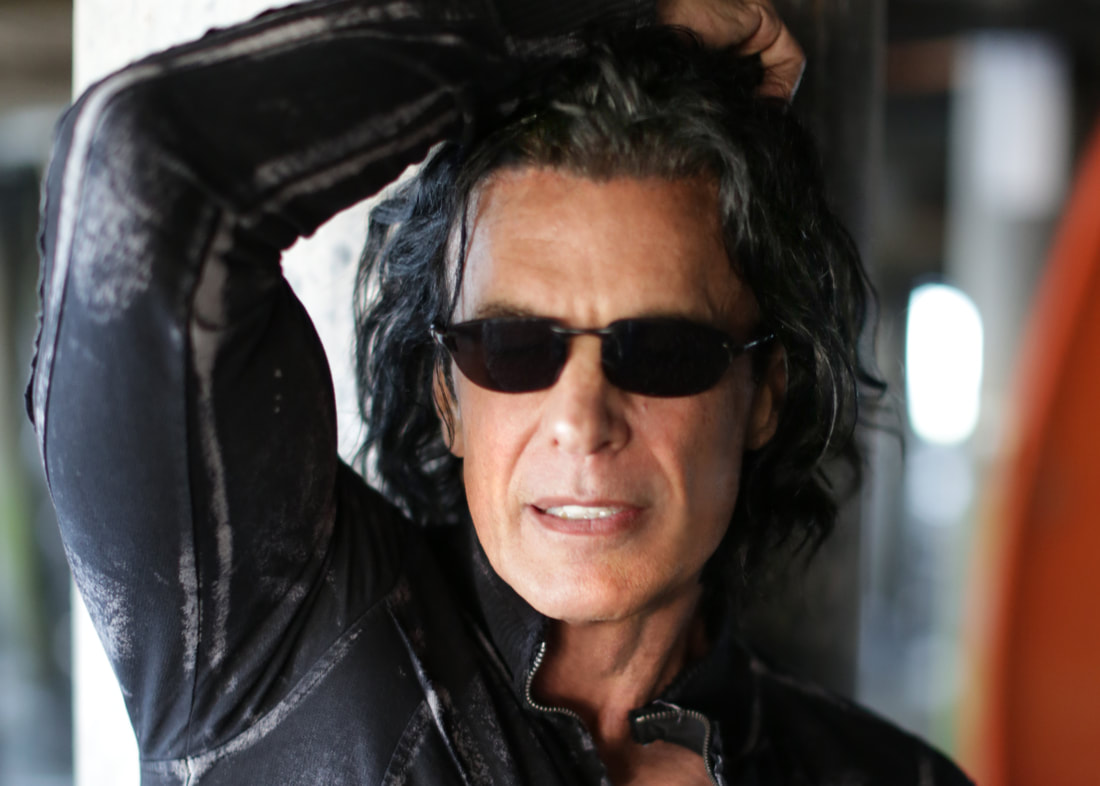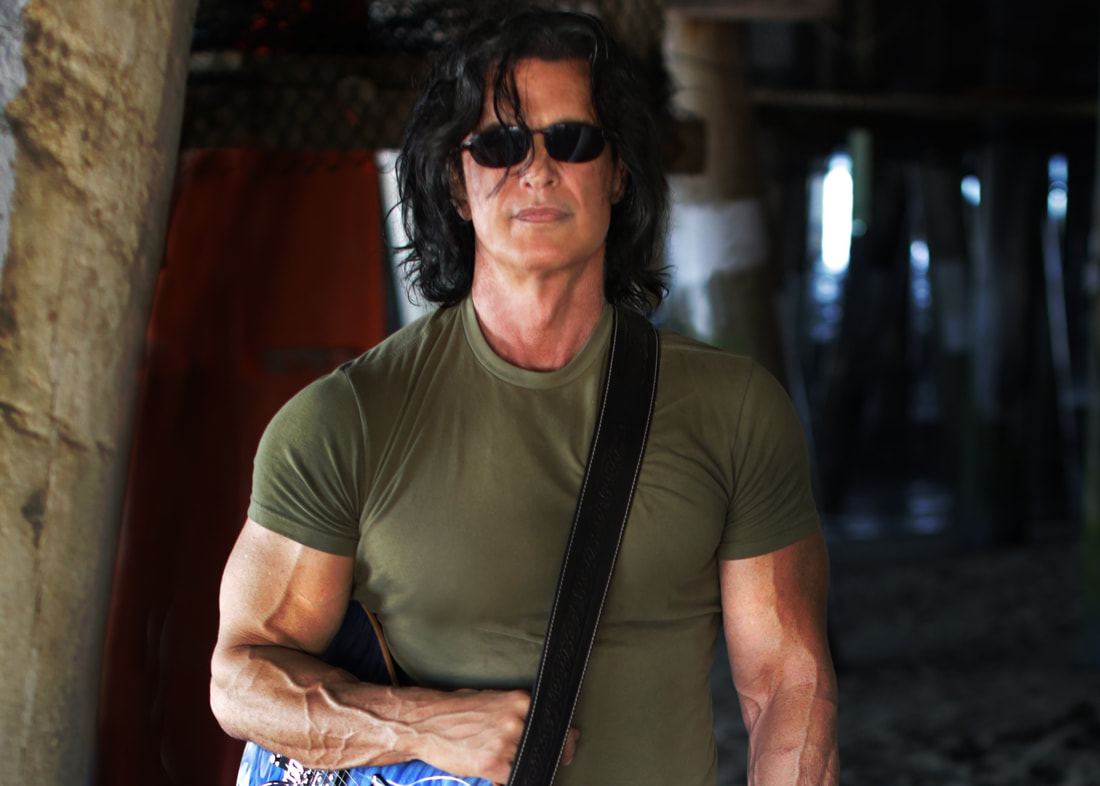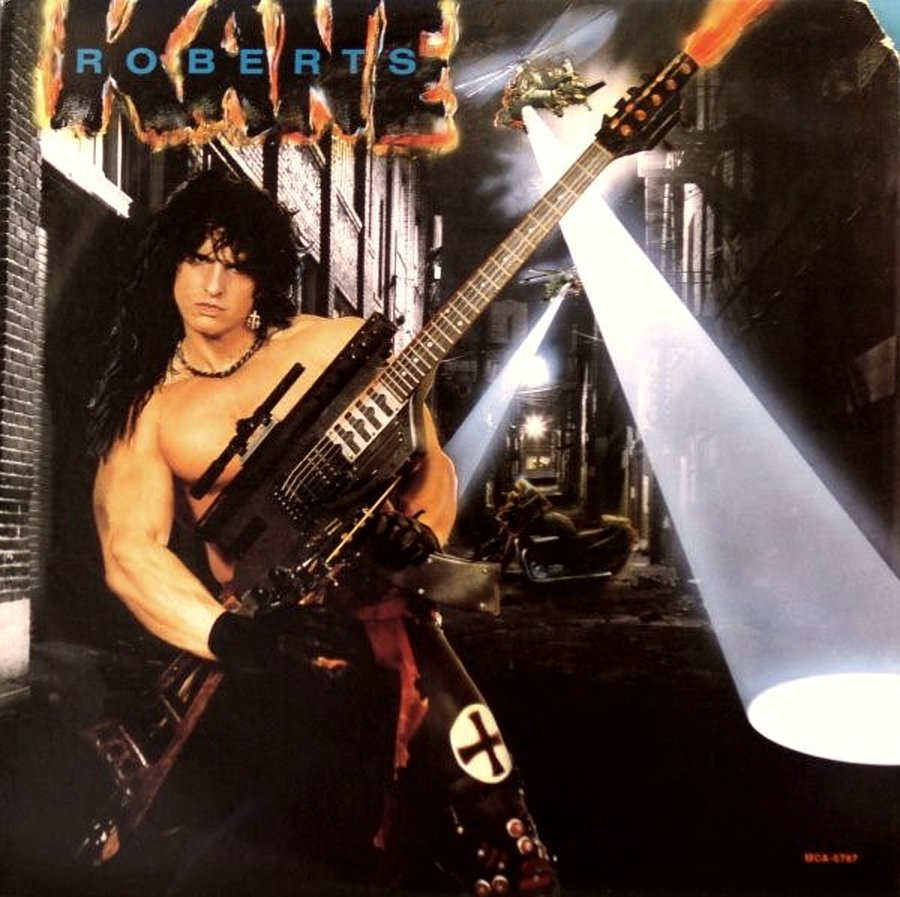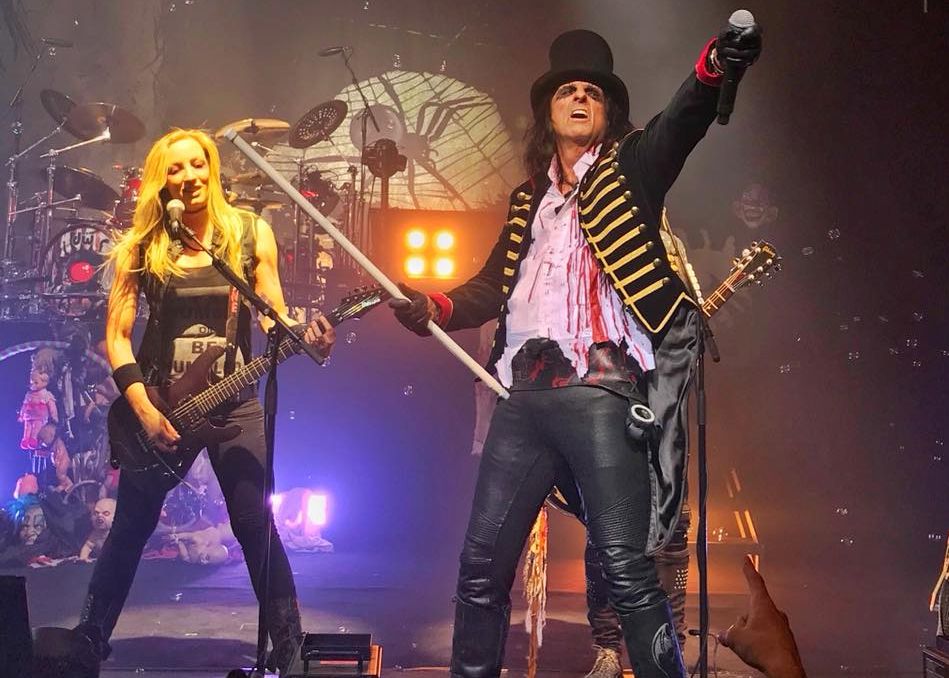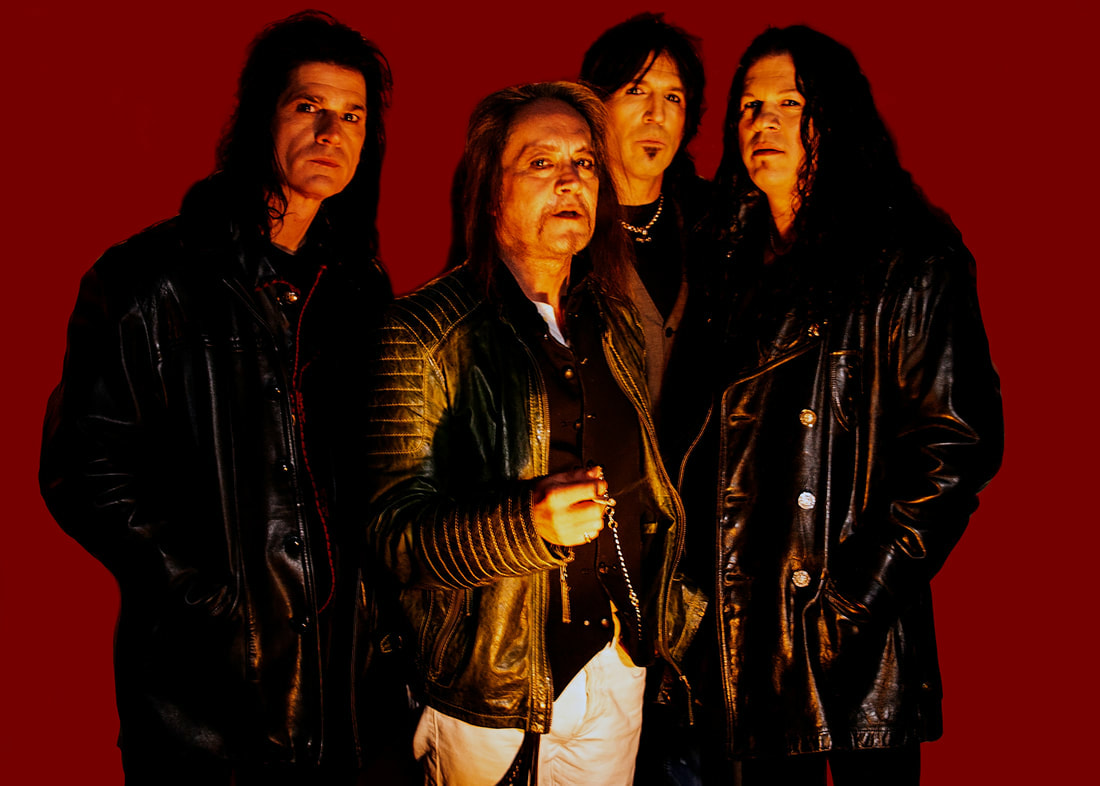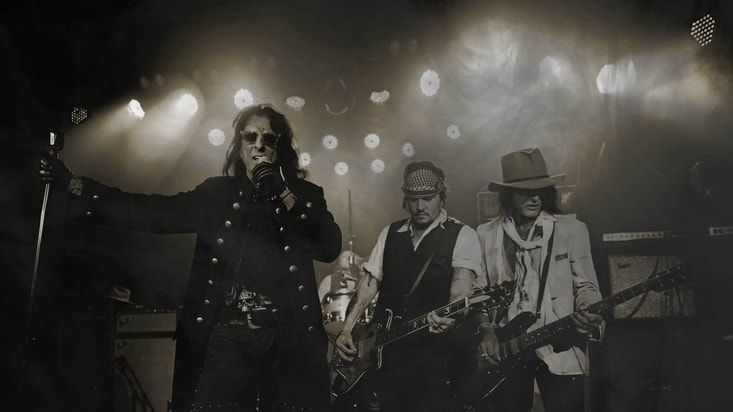|
The chosen sidekick who helped Alice Cooper relaunch his career, the unmistakable Kane Roberts provided the ferocious sound, look, and stage presence during the shock rocker’s ‘Constrictor’ and ‘Raise Your Fist And Yell’ period. Disappearing from the limelight after a run of solo albums, the six-stringer is now back, with an album that sees him briefly reuniting with the old boss. A humble, good-natured and humorous individual, we set down with Kane to chat ‘The New Normal’, his Alice Cooper years, and that infamous album cover. Teenage Frankenstein; Eamon O’Neill.
Hi Kane, you’re back with ‘The New Normal’, which is your first release in a number of years; how was it stepping back into the studio?
Well, it was one of those things where the music business aspect of things; that’s the stuff that makes me kind of go off the grid, kind of disappear. It’s not the music itself, or a lack of interest in it, or a lack of interest in guitar and the people that listen to the music I play. All that stuff is so addicting and so important, and it’s just such an opportunity and blessing that you can do something like that. So I never walk away from that; it’s just the business part of it is kind of lame. You have however, gotten over the business side of things, and come back. What happened was, I found myself in the studio, just recording stuff with this producer that I know, and Kip Winger heard one of the songs, and he said; “You know, you ought to run this by Serafino [Perugino] and Mario [de Riso] at Frontiers”. And to be honest with you, standing where I am right now, I’m amazed at those guys, because it took me three years to record the record! I was late on the video – the one that I did with Alice [Cooper] and Alissa from Arch Enemy, but I’m doing a ‘making of’ video so people will see some of the things that we went through, and the record company will see why I was so late with it! Did those delays get you into hot water? They got pissed off, and they were; “Where the fuck’s the video?”, or “Where the fuck’s the record?”, but when I gave it to them, and they liked the record, and it just sort of cured everything. So these guys are just absolutely passionate about music. They have a business model, but the core and the reason for it to exist, is music, so I found myself in the best business situation that I’d been in since I started trying to get record deals and do all that stuff. What was it like working on the album for all that time? I had all these songs, and I was all proud of myself - and we didn’t record one of them! We ended up throwing them all away and getting new material and letting the thing evolve. It just became this natural, creative flow. My co-producer and I just got into it on that level, so as I rediscovered my abilities, in terms of what I can do. I hadn’t stopped singing, but once you start recording and you’re putting it out there into the world, the pressure is on a little bit. So I was really happy to see I didn’t lose my vocal range, which was a cool thing. It sounds like it was the perfect creative process for you to re-emerge. In terms of the creative process, and the people I brought in to the mix, it just began to evolve and grow and grow, and over the three years of recording and mixing and all that stuff, it turned out to be something that was very honest. I wasn’t trying to serve any demographic, I wasn’t trying to say; “Oh, I want to sound modern”, or “I want to sound 80s”; none of that stuff mattered – it just became an honest experience. As you mentioned, you worked with Arch Enemy’s Alissa White-Gluz on first single ‘Beginning of the End’; what drew you to her?
I listen to everything. Although rock and heavy metal has pretty much been stamped out in the US by record companies or whatever, I’ve been listening to all the stuff that’s been happening overseas, and rock and metal are very alive and well over in Europe. So, on YouTube, I saw a band called The Agonist, and I was just really amazed by Alissa’s work, and the band as well. And then she went to Arch Enemy. And the sense that I got from her, the name of the album is ‘The New Normal’, and well, she’s right in the middle of that tornado; of what’s happening today, and the changes in culture, and the roles that people play. You see Arch Enemy come out on stage, and they’re massive, and out of the smoke comes Alissa, and she owns 80,000 people in the audience; she just does it. The song also features your old boss Alice Cooper. I called him up, and I said; “Hey Alice, would you want to sing on one of my songs?”, and he went; “Yeah, I’m in town, I’ll be right over!” He came over in like, half an hour! So while he was driving there, I wrote “I’ll cut their evil tongues” into the lyrics, because I knew he would just deliver that really well. So then I harassed him into taking his day off in Vancouver and shooting a video with me and Alissa. The song is deceptively heavy, given the relatively melodic sound of the album. What you’re hearing is how I’ve evolved as an artist, and the influences that I’ve had. I didn’t forget what happened before, and the stuff that I’m listening to now, and they’re all in the writing. Even the lyrical style is a little bit more edgy, a little bit more modern, in terms of some of the heavy-handed lyrics. Like the song ‘Who We Are’; it’s about two people who don’t quite know what to do with their relationship. So what you’re hearing, I think, is kind of a blend of styles and genres or influences. There’s also a slight industrial feel to the sound in places. Well, really that’s Kip Winger. His true sound that he loves is a very heavy sound. So I didn’t even hesitate; I just wanted him to play the bass on a lot of these songs, because he’s got such a deep, grinding sound when he’s doing exactly what he wants to do. The parts, we sort of worked them out a little bit before we gave them to him, but we said; “Do what you want”, ultimately, and the first thing he send back was what we accepted. It was the same thing with Alissa; the first thing she sent back we were just blown away. Going back the beginning of your career, and what was it like joining up with Alice Cooper back in 1986, and helping relaunch his career?
Well, their search at that time was not just; “Hey, let’s find a guitar player and a co-writer for Alice”; it was a little bit beyond that because he was coming out of a very special situation with where is career had been, and where he was in terms of rehab and all that stuff that was going on. So the things that they liked about me, first it was the music; Bob Ezrin [producer] heard a tape I had sent out, and that was number one. Number two, they wanted to make sure, I think, that I wasn’t just part of the same things that were happening everywhere; they looked for something a little different. So I walked in the room; I didn’t look proper, I didn’t do any drugs, I didn’t drink or anything, and the final thing was that Alice and I became best friends, literally within ten minutes of meeting each other. It was very bizarre, and it was almost like we knew each other for a lot of years. So that’s what got you the job? Those were the type of things that got my foot in the door, and then when I said to Alice; “When you come back, especially live, we don’t want people to think you ‘survived’ rehab”, I said; “You’ve got to come back like a nuclear version; like you were bitten by a nuclear beast or something like that. And that it’s a different version of you, because you have to compete with Ozzy and Van Halen and all these bands that are out there; you can’t just sort of assume that what you did before, and manner that you presented it is going to get you through the day” because, the culture of rock and metal was changing. So, you can see how that discussion manifested itself. What was the first show you played with Alice like for you? That tape; ‘The Nightmare Returns’ was our first show, believe it or not, at Joe Louis Arena in Detroit. Detroit’s like Alice’s home town, and that’s where he’s going to get the most criticism, and it was being filmed, Halloween night on MTV, live. So, the band - me included - we were sweating bullets. The first chords get played, and Alice goes [*singing*]; “Welcome to my nightmare”, and the crowd goes crazy! We came back heavy, and hard, and we tried to preserve the essence of these classic, sacred songs – I feel like everybody else does about them – so we wanted to inject this sort of, high-octane metal into these songs and pull it off properly. I think we did a really good job. Alice was very co-operative, but he wasn’t passive; he’s a very aggressive creative in the process, but you can see that we wanted to do something a little different, and you can see how I worked my way into the organisation. The albums you recorded; ‘Constrictor’ [1986] and ‘Raise Your Fist and Yell’ [1987] mark a very specific period in Alice Cooper history. If you listen to ‘Constrictor’; you see two artists that hung out every day for a year and put the songs together, who walk into the studio with Beau Hill [producer] who’s got a whole different kind of a vision of stuff than we do, and we’re just sort of punching our way through the creative process. It was a reality check for me. I was sitting in my apartment in New York before coming out to L.A. to write with Alice, and I thought I was like the shit on guitar, and I came out there and it was like, hundreds of amazing guitar players walking around Hollywood. So I said, I guess I’d better practice! And then after one tour, especially with Alice Cooper, it’s like going to school, and I sort of learned the ropes. And ‘Raise Your Fist And Yell? The second album, we had done a tour together, and the band was just so together, so we hit the ground running, like, pushed our way into the studio and recorded ‘Raise Your Fist’. Alice and I had been writing it on the road the whole time, and we decided to do a kind of a theatre type thing, where it was a culture of violence we were writing about, and it all took place in this madman’s head. And without getting too theatrical or story-like on it, I think we pulled off sort of a very aggressive, cool metal album on that second record. ‘Freedom’, ‘Roses on White Lace’, ‘Prince of Darkness’ and ‘Gail’; those things just flowed out of us, because we were a better creative team at that point. The stand-out track is ‘Freedom’, which has got a similar staccato-style riff to ‘Bark At The Moon’. Oh totally, yeah. I was a big Randy Rhoads / Jake E. Lee fan; I was really into how they played rhythm, as well as solos and stuff, so you can hear those influences on there. You know, here’s one thing that’s really intense; you think about Alice, what he had done before, and now, you put this massive metal foundation under him – especially live, and he totally turned up the volume. He totally was able to just sit on top of it and just rule the band. It just really blew my mind. As soon as he stepped up there onto the stage, the band was just not nervous; if you get behind a race car, the draught pulls you in, and that’s exactly what happened just about every night. Did you have any sense of trepidation at all re-launching a metalised-Alice Cooper, given that it was a totally new sound and look for him?
You know, when I went down to meet them; it was Ezrin, Shep Gordon - one of the most famous managers in the world, and I’m the type of person that I just get into the flow. So it either is a type of ignorance on my part, but once Alice and I became great friends, all of that stuff – record company, management; that’s where all the trepidation was – he and I felt very confident, very in sync. When we would make decisions, it was done, part out of the friendship and the joy of creating together, and also getting a real sense – especially on ‘Constrictor’ – that we knew that was going to go somewhere else. ‘The World Needs Guts’ and ‘Teenage Frankenstein’, we could tell that that stuff was going to morph into something a lot heavier and a lot more complex and intense, and that’s what ‘Raise Your Fist and Yell’ was. But we understood that from the beginning. So, I’m not discounting what you’re saying; the trepidation was there when we were behind the stage on that first show, I guarantee it, but once things got rolling, he and I just ploughed ahead and let everybody else sweat bullets; that’s why they get paid most of the money, right?! What was it that brought your partnership to an end? Well, it’s almost like different outside teams kind of entered and separated us. I was doing the ‘Saints And Sinners’ [1991] record on Geffen; that was a big deal for me, and I wanted to take a real shot on that, and Alice was moving into the [more commercial phase]. Both of us ended up writing with Desmond Child, which was unusual, but you could see there was almost a calculated effort to maximise what he and I could each do, separately. But I’ll tell you something; he and I never stopped being best friends. He came up to play in Vancouver, and he asked me to come in and sit with him on ‘School’s Out’, which I didn’t do because I had too much to do the night before the show. But who knows what might happen? But if he and I are going to do some more, I’m going to harass him and see if I can do some writing on his next record. You’re remembered in Alice’s band for not only your musicianship, but your striking image at the time. It wasn’t a calculated thing on my part. One of the reasons that Alice and I got together is we have this obsessive, almost addictive personality. So, yeah, I just started lifting weights, and I got into it. I always tell people; I never wanted to put on a Speedo and oil up and get on stage for some bodybuilding contest. It wasn’t that; it was just an activity that I got into, and the gratification of it kept pushing me. So, once I got pretty big, I was thinking that’s one of the reasons why Alice and Shep liked me; because I didn’t look like everybody else. And that’s what Alice has always been; he’s not like anybody else. So they loved that, in terms of like, it made me kind of like a stage prop, as much as a guitar player, which I thought was pretty funny! When I look back on it, I don’t regret doing it, and I don’t look at it like it was something that I was planning and I hoped people would like; it just kind of took place, believe it or not. Back to the present, and have you any plans to tour the new album? I really don’t know. It’s a little bit of a complex situation, and if I wanted to really get back in the saddle again and do stuff, it would take me years to get my footing back on what’s going on. Also, I did a show called Firefest [in 2011], and I think I had two rehearsals with guys I didn’t know, and they were fine, but I hadn’t played in like, a hundred years, and it was like a fucking nightmare. So, I would really have to climb that mountain properly and get a great band together. There’s some guys that I work with occasionally called Maverick; they’re one of my favourite bands, and that’s my first notion of what my band would be. I had David [Balfour] sing, and Ryan [Balfour] played a little bit of guitar on the record. These guys are awesome, and they’re the real deal, so in order for me to get back into it, it’s a lot of work, and the standard has to be really high, so there’s got to be a good reason for me to do it. So, let’s see what takes place over the next few months. I’ve got some offers to do shows, but I haven’t accepted anything yet. You must have had lots offers to join other bands after parting ways with Alice Cooper.
This is such an interesting question, and it’s actually got a real strange answer. My belief has always been if you work hard enough, if you really become obsessed with whatever it is that you want to do in life, and you get yourself to a certain level – and I’m not saying I’m special or anything because of how much work I did - but I believe the world will beat a path to your door. It’ll eventually greet you with open legs, and I’m living proof of that, because if you think about it, Alice Cooper, with the way I looked, was the only band on the planet that ever would have hired me. Somehow, I ended up in front of Alice. It was kind of crazy, so that rule still took place once I left Alice; no-one’s going to hire me. My point is that, no, I didn’t get one offer. And I didn’t expect it, because I think one of the reasons is my image, my history or whatever; there’s a little bit of a few too many layers of unusual on top of it for people to sort of say; “Okay, let’s get Kane in the band”. So there were no offers at all? Think about it; Cinderella; “Oh, he weighs 230lbs, he’s perfect!” It wasn’t going to happen! White Lion wants me to join? That’s not going to happen. There’s guys that would do it if they thought it was the right thing; people that I’ve met, musicians and stuff, but I always say, Alice Cooper was the only band that would ever hire me. Believe me; the phone never rang, but I told myself, that’s the reason. Now, I couldn’t let you go without discussing the artwork for your 1987 self-titled solo album, which routinely crops up on those ‘Worst Album Cover’ lists. I was on tour with Alice, and the MCA album was getting ready to be released. Back in those days, they had those Polaroid cameras, so they sent me a photo [of a rough draught of the album cover], and it was black and white, and I was looking at it going; “What the fuck is this?!” It was a photo that this really great photographer Peter Cronin took of me in that pose with the gun guitar, underneath Joe Louis Arena, at that first show. That’s where that photo comes from. I’m there [on the sleeve], and I’m in an alley, and behind me is a little Vespa motor scooter, and I’m looking at it going; “Seriously?!” And then they wrote my name in flames, and it looked like ‘Kake Roberts’. That wasn’t a good start. I’m going; “What the…?!” So I called the guy up, and I go; “That’s the best motorcycle you could find?! Shouldn’t I be arriving on some big hog of a bike; like a Harley or something”, and they said; “It was the only one we could find!” And I said; “By the way; it says ‘Kake Roberts, and by the way, I’m not going to have this weaponised guitar weighing 230lbs, and be riding a yellow scooter – it’s not going to happen!” So they revised the cover? They sent another cover, and this one is a little bigger scooter, and now it says ‘Hane Roberts’ with an ‘H’ – they changed the first K! So, it’s really funny; I was sitting with Vito [Bratta] from White Lion, and he said he had the worst cover ever, which was the one with the lion in the grass with the White House behind it [‘Big Game’, 1989], and I said; “No, I think I got ya beat; mine’s like a McDonalds commercial on acid”, you know what I mean? So he still thinks his is worse than mine. But mine, every time I look at that, I’m going like; “Seriously! Who’s that artist?!” If the guy ever reads this article, I don’t want you to feel bad, but it’s not ‘Kake’, it’s KANE! How was it playing that gun guitar? The guy, Rick Johnson that made it, he was an army brat; his father was a general in the army or something, and it’s one of the best guitars I ever played. It was a joy to use that guitar. When he brought it out and showed it to me, I was going; “What the fuck?!”, and then when I started playing it, I was going; “Jesus, dude, you really know what you’re doing”. I had him change the pick-ups, and adjust the action, and do all sorts of stuff, and it was the best guitar I played every night, absolutely. Well, it’s certainly produced an enduring image. One last thing I’ll tell you; I was on the bus with Alice, and I’m reading Creem magazine, and it said; “Alice Cooper, blah blah blah”, and then they said; “His underrated guitar player” - it was very complimentary - and then they said; “Kane ‘Rambo’ Roberts”, and I went; “Where the fuck are they getting that?!” I was clueless! I said to Alice, I said; “Rambo Roberts?! What is that?!” And then I looked at one of the photos, and all I needed was a headband, you know what I mean? It was unbelievable! So everybody says; “Did you really calculate your image?”, and that’s how clueless I was. Finally, do you still have the gun guitar? Well, I had three of them; one is in the Hard Rock Café in New Orleans, one of them is on the wall of the Hard Rock in Israel, and the other one, some collector bought it from me. I have no memorabilia; nothing, not one gold record, and I don’t have a copy of my CDs from back in the day, not one of them. I’m one of those guys - and I don’t do it aggressively – but it’s just sort of a natural flow of things. I mean, I had a ‘Raise Your Fist and Yell’ really nice bath robe with my name on it, and some collector wanted it and I just gave it to him. So I hit the eject button on a lot of stuff. It’s not because I’m upset about anything, it’s just sort of a natural thing. I’ve never kept anything. Like this interview? Like us on Facebook and follow us on Twitter for regular updates & more of the same. Kane Roberts' 'The New Normal' is out now, via Frontiers. |
|
KAne Roberts
"With the way I looked, Alice Cooper was the only band on the planet that ever would have hired me."
© 2016 - 2024 eonmusic.co.ukContact: [email protected]
|

